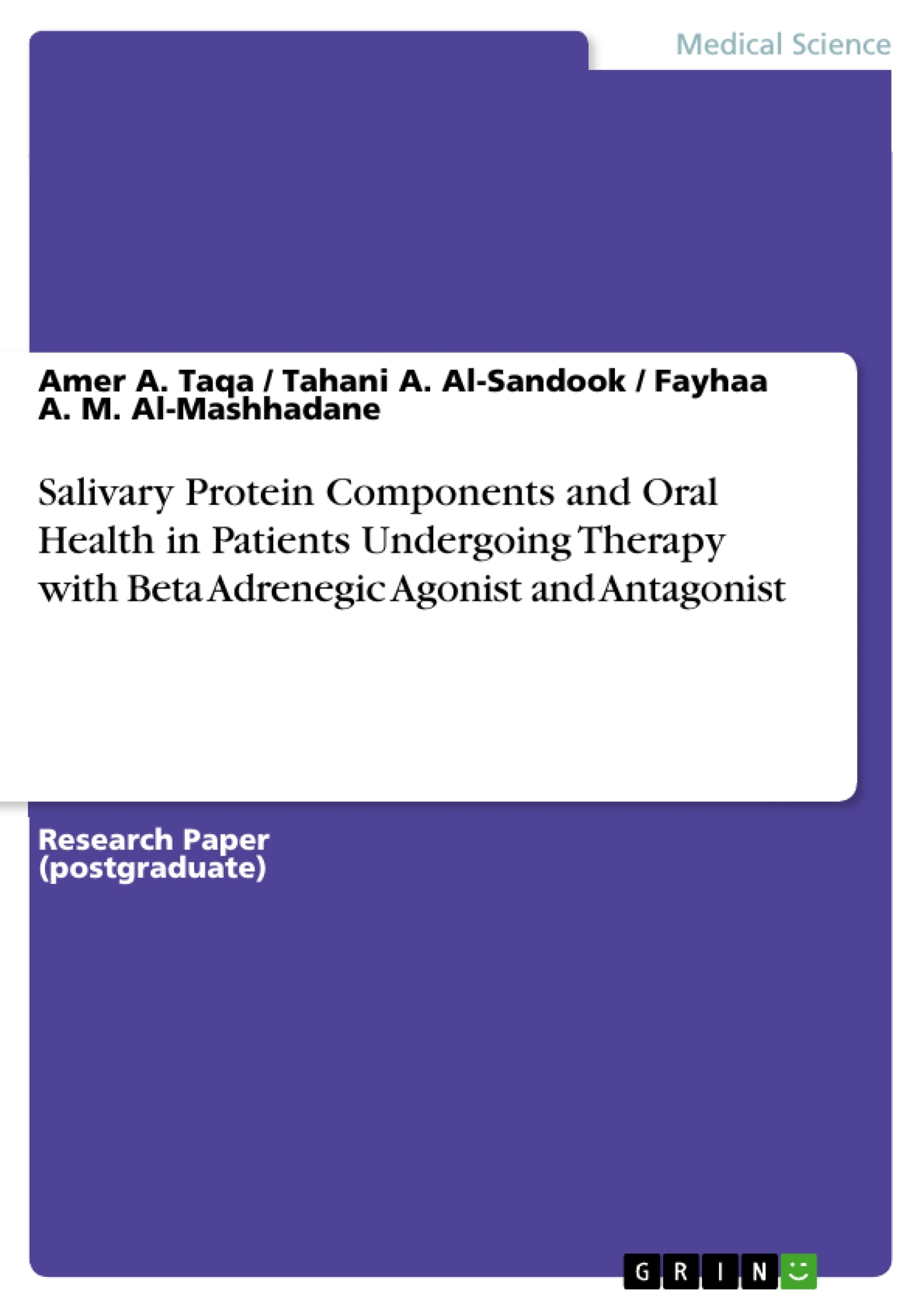Aims: To study the effect of Beta–adrenergic agonist (salbutamol) and Beta adrenergic antagonist (atenolol)
on salivary protein concentration and to study relation between salivary protein concentration
and oral health. Materials and Methods: This study was carried out on 45 individuals; 15 individuals
of them were apparently healthy with no history of systemic diseases and represent a control group, the
second group which comprised 15 subjects were given adrenergic agonist drug (salbutamol) for treatment
of asthma, and third group (15 individuals) were given adrenegic antagonist drug (atenolol) for
treatment of hypertension. subjects were selected from the out patients attending Oral Surgery Department,
College of Dentistry, University of Mosul. The samples of saliva were collected using spitting
method and oral hygiene index simplified was recorded for each individual and total protein concentration
of these saliva samples were determined. Its relation to oral health was measured according
to simplified oral hygiene index by Greene and Vermillion. Results: The results of this study revealed
that in all study groups, significant differences were present for both salivary protein concentration and
oral health scores and there is correlation between salivary protein concentration and oral health in patients
receiving atenolol. Conclusions: Chronic treatment with adrenergic agonist and antagonist drugs,
resulted in changes in salivary protein concentration and those will affect the oral health of patients
treated by these drugs.
Inhaltsverzeichnis (Table of Contents)
- ABSTRACT
- INTRODUCTION
- MATERIALS AND METHODS
- RESULTS
- DISCUSSION
- CONCLUSIONS
- REFERENCES
Zielsetzung und Themenschwerpunkte (Objectives and Key Themes)
This study aims to investigate the effects of beta-adrenergic agonist (salbutamol) and beta-adrenergic antagonist (atenolol) on salivary protein concentration and their correlation with oral health. The study focuses on identifying any changes in salivary protein concentrations due to these medications and their impact on the oral health of patients undergoing treatment.
- Influence of beta-adrenergic drugs on salivary protein concentration
- Relationship between salivary protein concentration and oral health
- Comparison of the effects of salbutamol and atenolol on salivary protein concentration and oral health
- Potential implications of changes in salivary protein concentration for oral health management
- Role of saliva in oral health and its potential as a diagnostic tool
Zusammenfassung der Kapitel (Chapter Summaries)
The study involved 45 participants, including a control group and two groups receiving either salbutamol or atenolol. Saliva samples were collected and analyzed for protein concentration using the Biuret method. Oral hygiene was assessed using the Simplified Oral Hygiene Index. The results showed significant differences in salivary protein concentration and oral health scores among the groups. While salbutamol had a minor impact on salivary protein concentration, atenolol significantly reduced it. The study found a correlation between salivary protein concentration and oral health scores in patients receiving atenolol.
The discussion highlighted the essential role of saliva in maintaining oral health and the potential impact of medications on salivary protein concentration. Salbutamol, a beta-2 agonist, reduces saliva production but increases protein concentration, while atenolol, a beta-2 antagonist, increases saliva production but decreases protein concentration. The study’s findings suggest that changes in salivary protein concentration induced by medications can negatively affect oral health. The authors advocate for further research to address the challenges presented by medication-induced alterations in salivary protein concentration.
Schlüsselwörter (Keywords)
The study focuses on the impact of beta-adrenergic agonists and antagonists on salivary protein concentration and its relationship to oral health. Key terms and concepts include salivary proteins, adrenergic agonists and antagonists, oral health, salbutamol, atenolol, and the Simplified Oral Hygiene Index. The study emphasizes the importance of saliva as a diagnostic fluid and its role in maintaining oral health.
Frequently Asked Questions
How do beta-adrenergic drugs affect saliva?
Beta-adrenergic agonists like salbutamol can increase protein concentration, while antagonists like atenolol can significantly reduce it, affecting oral health.
What was the link between atenolol and oral health?
The study found a significant correlation between reduced salivary protein concentration and poorer oral health scores in patients taking atenolol for hypertension.
Which groups were studied in this research?
The study included 45 individuals: a healthy control group, an asthma group (salbutamol), and a hypertension group (atenolol).
How was oral hygiene measured?
The researchers used the Simplified Oral Hygiene Index (OHI-S) by Greene and Vermillion to assess the participants' dental health.
Why is salivary protein important?
Salivary proteins play a crucial role in maintaining oral health, protecting teeth, and managing the oral environment; changes induced by medication can lead to dental issues.
- Quote paper
- Dr. Amer A. Taqa (Author), Tahani A. Al-Sandook (Author), Fayhaa A. M. Al-Mashhadane (Author), 2007, Salivary Protein Components and Oral Health in Patients Undergoing Therapy with Beta Adrenegic Agonist and Antagonist, Munich, GRIN Verlag, https://www.grin.com/document/207702



